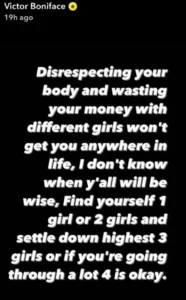In the high-stakes arena of European football, it’s not just what you do on the pitch that draws attention—it’s what you post off it. For Victor Boniface, the spotlight shifted from goals and assists to damaged car mirrors, cryptic captions, social‐media sermons, and eyebrow-raising relationship advice.
It’s 2025, he’s a 24-year-old Nigerian striker on loan at Werder Bremen, and suddenly, the club’s expectations extend beyond athletic performance into daily conduct, online tone, public perception.
A player’s net worth, shirt number, or his first goal can win hearts. But here, a post about settling down, criticism of spending “on too many women,” subtler nods, even a Snapchat vid of a smashed mirror—these ordinary-seeming moments rippled into something bigger. WTF does “Ok Bremen” mean with a busted mirror? Why “at most three women—or if you are going through a lot four is okay”? What kind of responsibility comes with being a role model when your followers see you in neon lights or behind content filters?
Now, Bremen has summoned Boniface. Because in this age, what you broadcast can be just as impactful as your ball control.
What Exactly Happened — Key Details
Boniface has been called in by Werder Bremen management after recent social media posts stirred discomfort within the club. These posts include relationship-advice messages, cryptic snippets, and more personal commentary.
One of the posts read: “If you waste your money on too many women, you will not achieve anything in life. Find yourself one or two women and settle down. At most three women, or if you are going through a lot, four is also okay.”

This post attracted attention both from fans and media, some calling it humorous, others criticizing it for tone, respect, and being potentially misogynistic.
Another post showed a damaged side mirror of his car—he captioned it “Ok Bremen.” It’s unclear what the post was meant to imply, but it added to what the club sees as “strange” or “inconsistent” communications.
According to reports, Werder Bremen has not issued a full public statement but is arranging a closed-door meeting between Boniface and the club hierarchy to clarify the nature and intent of his social media activity.
Beyond Social Media Drama — Deeper Implications
1. Player Image & Club Reputation
Clubs increasingly see players as brands. What they post reflects not just personal taste but team values. When off-field behavior is seen to clash with club standards, especially in foreign environments where cultural norms differ, management often steps in.
2. Cultural Misunderstandings & Sensitivities
What may seem lighthearted or typical in one context (e.g., among fans in Nigeria) may be misunderstood or disapproved of in another. Cryptic posts might be seen as disrespect, controversial advice may be judged as inappropriate. What’s acceptable in one sphere may trigger trouble in another.
3. Gender & Respect Conversations
Boniface’s comments about “too many women” or “finding few women” tap into gender relations, expectations, and respect. That can polarize audiences. Some see straightforward advice; others see sexism or objectification. This kind of public text forces footballers to navigate moral, social, and reputational minefields.
4. Mental Health, Consistency & Media Pressure
Young players are under pressure: performance, expectations, criticism, virality. Sometimes posts are made in passing, without full reflection. But in today’s digital age, every post lingers. Managing that is part of being a professional in the modern game.
5. Club Discipline & Cohesion
If the player’s behavior off the field becomes a distraction or breeds dissent (among fans, media, teammates), clubs often act—not just to punish, but to ensure team cohesion. Bremen calling him in signals seriousness: they want clarity, boundaries, maybe a warning.
Should Footballers Be Controlled or Just Guided?
This incident raises broader questions: Where is the line between personal expression and professional decorum? Are clubs acting out of protection or control? Do players surrender part of their personal freedoms when they become public figures?
Boniface’s case may serve as a lesson: that in today’s game, with culture, race, national identity, and cross-border expectations, silence or avoidance is rare. Every tweet, snap, or message becomes part of the narrative.
But also, it begs empathy. A young man, far from home, under scrutiny, with passion, fear, maybe ego, maybe imposter syndrome, maybe cultural contradictions. Should clubs demand perfection? Or teach better?
Goals, Virality, and What Comes Next
Victor Boniface has promise—on the field, he’s shown flashes: a solid debut assist, strength, positional promise. But this moment off the field could define how he’s seen: as a raw talent who matures under scrutiny, or as a liability overwhelmed by his own online footprints.
You May Like: “I’ll Use You as a Scapegoat” — Paul Okoye Responds to Rape Allegation Against Him
Werder Bremen’s decision to summon him is a test—for the player and the club. It’s where performance meets perception, where goals meet guidelines.







